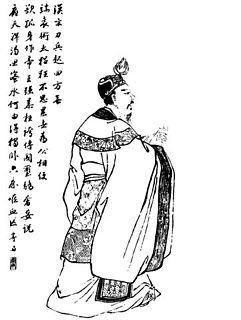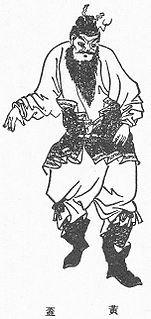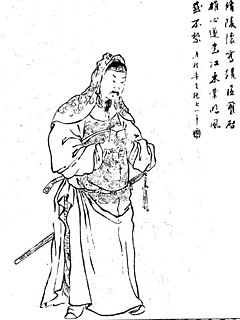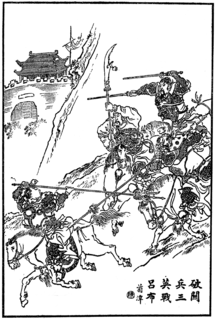| Battle of Sishui Pass | |||||||
| Traditional Chinese | 汜水關之戰 | ||||||
|---|---|---|---|---|---|---|---|
| Simplified Chinese | 汜水关之战 | ||||||
| |||||||
The Battle of Sishui Pass is a fictional battle described in the 14th-century historical novel Romance of the Three Kingdoms . The battle was fought between the forces of Dong Zhuo and a coalition of regional warlords and officials (known as the Guandong Coalition) as part of the Campaign against Dong Zhuo in 190 during the prelude to the Three Kingdoms period.
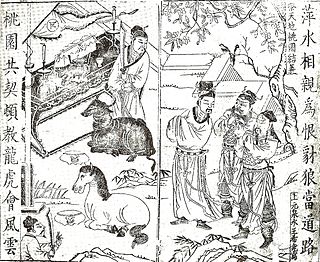
Romance of the Three Kingdoms or Sanguo Yanyi is a 14th-century historical novel attributed to Luo Guanzhong. It is set in the turbulent years towards the end of the Han dynasty and the Three Kingdoms period in Chinese history, starting in 169 AD and ending with the reunification of the land in 280.

Dong Zhuo, courtesy name Zhongying, was a military general and warlord who lived in the late Eastern Han dynasty of China. He seized control of the capital Luoyang in 189 when it entered a state of turmoil following the death of Emperor Ling of Han and a massacre of the eunuch faction by the court officials led by General-in-Chief He Jin. Dong Zhuo subsequently deposed Liu Bian and replaced him with the puppet Emperor Xian of Han. Dong Zhuo's rule was brief and characterized by cruelty and tyranny. In the following year, a coalition of regional officials and warlords launched a Campaign against Dong Zhuo. Failing to stop the coalition forces, Dong Zhuo sacked Luoyang and relocated further west to Chang'an. He was assassinated soon after in 192 by his subordinate Lü Bu in a plot orchestrated by Interior Minister Wang Yun.

The Campaign against Dong Zhuo was a punitive expedition initiated by a coalition of regional officials and warlords against the warlord Dong Zhuo in 190 in the late Eastern Han dynasty. The members of the coalition claimed that Dong had the intention of usurping the throne by holding Emperor Xian hostage and by establishing a strong influence in the imperial court. They justified their campaign as to remove Dong from power. The campaign led to the evacuation of the capital Luoyang and the shifting of the imperial court to Chang'an. It was a prelude to the end of the Han dynasty and, subsequently, the Three Kingdoms period.


